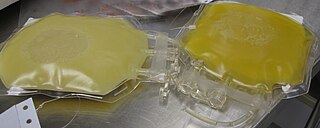Related Research Articles

Low-density lipoprotein (LDL) is one of the five major groups of lipoprotein that transport all fat molecules around the body in extracellular water. These groups, from least dense to most dense, are chylomicrons, very low-density lipoprotein (VLDL), intermediate-density lipoprotein (IDL), low-density lipoprotein (LDL) and high-density lipoprotein (HDL). LDL delivers fat molecules to cells. LDL is involved in atherosclerosis, a process in which it is oxidized within the walls of arteries.

Statins, also known as HMG-CoA reductase inhibitors, are a class of lipid-lowering medications that reduce illness and mortality in those who are at high risk of cardiovascular disease. They are the most commonly prescribed cholesterol-lowering drugs.
Lipid-lowering agents, also sometimes referred to as hypolipidemic agents, cholesterol-lowering drugs, or antihyperlipidemic agents are a diverse group of pharmaceuticals that are used to lower the level of lipids and lipoproteins such as cholesterol, in the blood (hyperlipidemia). The American Heart Association recommends the descriptor 'lipid lowering agent' be used for this class of drugs rather than the term 'hypolipidemic'.

Hypercholesterolemia, also called high cholesterol, is the presence of high levels of cholesterol in the blood. It is a form of hyperlipidemia, hyperlipoproteinemia, and dyslipidemia.
Dyslipidemia is a metabolic disorder characterized by abnormally high or low amounts of any or all lipids or lipoproteins in the blood. Dyslipidemia is a risk factor for the development of atherosclerotic cardiovascular diseases (ASCVD), which include coronary artery disease, cerebrovascular disease, and peripheral artery disease. Although dyslipidemia is a risk factor for ASCVD, abnormal levels don't mean that lipid lowering agents need to be started. Other factors, such as comorbid conditions and lifestyle in addition to dyslipidemia, is considered in a cardiovascular risk assessment. In developed countries, most dyslipidemias are hyperlipidemias; that is, an elevation of lipids in the blood. This is often due to diet and lifestyle. Prolonged elevation of insulin resistance can also lead to dyslipidemia. Likewise, increased levels of O-GlcNAc transferase (OGT) may cause dyslipidemia.
Sanofi S.A. is a French multinational pharmaceutical and healthcare company headquartered in Paris, France. Originally, the corporation was established in 1973 and merged with Synthélabo in 1999 to form Sanofi-Synthélabo. In 2004, Sanofi-Synthélabo merged with Aventis and renamed to Sanofi-Aventis, which were each the product of several previous mergers. It changed its name back to Sanofi in May 2011. The company is a component of the Euro Stoxx 50 stock market index.

Simvastatin, sold under the brand name Zocor among others, is a statin, a type of lipid-lowering medication. It is used along with exercise, diet, and weight loss to decrease elevated lipid levels. It is also used to decrease the risk of heart problems in those at high risk. It is taken by mouth.

Pitavastatin is a member of the blood cholesterol lowering medication class of statins.

Regeneron Pharmaceuticals, Inc. is an American biotechnology company headquartered in Westchester County, New York. The company was founded in 1988. Originally focused on neurotrophic factors and their regenerative capabilities, giving rise to its name, the company then branched out into the study of both cytokine and tyrosine kinase receptors, which gave rise to their first product, which is a VEGF-trap.

Familial hypercholesterolemia (FH) is a genetic disorder characterized by high cholesterol levels, specifically very high levels of low-density lipoprotein cholesterol, in the blood and early cardiovascular diseases. The most common mutations diminish the number of functional LDL receptors in the liver or produce abnormal LDL receptors that never go to the cell surface to function properly. Since the underlying body biochemistry is slightly different in individuals with FH, their high cholesterol levels are less responsive to the kinds of cholesterol control methods which are usually more effective in people without FH. Nevertheless, treatment is usually effective.
Panitumumab, sold under the brand name Vectibix, is a fully human monoclonal antibody specific to the epidermal growth factor receptor.

Proprotein convertase subtilisin/kexin type 9 (PCSK9) is an enzyme encoded by the PCSK9 gene in humans on chromosome 1. It is the 9th member of the proprotein convertase family of proteins that activate other proteins. Similar genes (orthologs) are found across many species. As with many proteins, PCSK9 is inactive when first synthesized, because a section of peptide chains blocks their activity; proprotein convertases remove that section to activate the enzyme. The PCSK9 gene also contains one of 27 loci associated with increased risk of coronary artery disease.
Sarilumab, sold under the brand name Kevzara, is a human monoclonal antibody medication against the interleukin-6 receptor. Regeneron Pharmaceuticals and Sanofi developed the drug for the treatment of rheumatoid arthritis (RA), for which it received US FDA approval on 22 May 2017 and European Medicines Agency approval on 23 June 2017.

Dupilumab, sold under the brand name Dupixent, is a monoclonal antibody blocking interleukin 4 and interleukin 13, used for allergic diseases such as eczema, asthma and nasal polyps which result in chronic sinusitis. It is also used for the treatment of eosinophilic esophagitis and prurigo nodularis.
Evolocumab, sold under the brand name Repatha, is a monoclonal antibody that is an immunotherapy medication for the treatment of hyperlipidemia.
Bococizumab is a drug that was in development by Pfizer targeting PCSK9 to reduce LDL cholesterol. Pfizer withdrew the drug from development in November 2016, determining that it was "not likely to provide value to patients, physicians or shareholders."
Evinacumab, sold under the brand name Evkeeza, is a monoclonal antibody medication for the treatment of homozygous familial hypercholesterolemia (HoFH).
Inclisiran, sold under the brand name Leqvio, is a medication used for the treatment of high low-density lipoprotein (LDL) cholesterol and for the treatment of people with atherosclerotic cardiovascular disease (ASCVD), ASCVD risk-equivalents, and heterozygous familial hypercholesterolemia (HeFH). It is a small interfering RNA (siRNA) that acts as an inhibitor of a proprotein convertase, specifically, inhibiting translation of the protein PCSK9.
Bempedoic acid, sold under the brand name Nexletol among others, is a medication for the treatment of hypercholesterolemia.
Bempedoic acid/ezetimibe, sold under the brand name Nexlizet among others, is a fixed-dose combination medication used for the treatment of high cholesterol. It is a combination of bempedoic acid and ezetimibe.
References
- ↑ "Prescription medicines: registration of new chemical entities in Australia, 2016". Therapeutic Goods Administration (TGA). 21 June 2022. Retrieved 10 April 2023.
- 1 2 3 4 5 6 7 8 9 "Praluent- alirocumab injection, solution". DailyMed. Retrieved 1 April 2021.
- 1 2 3 4 5 6 "Therapy for patients with severely high cholesterol". U.S. Food and Drug Administration (FDA). 1 March 2021. Retrieved 1 April 2021.
- 1 2 "Praluent EPAR". European Medicines Agency (EMA). 17 September 2018. Retrieved 1 April 2021.
- 1 2 Kolata G (27 July 2015). "Praluent Looks Cheap to Those With Extreme Cholesterol". New York Times.
- 1 2 3 "Press release: FDA approves Praluent to treat certain patients with high cholesterol". U.S. Food and Drug Administration. 24 July 2015.
- 1 2 3 Szabo L (24 July 2015). "FDA approves new cholesterol drug - at $14,600 a year". USA Today.
- ↑ Schwartz GG, Steg PG, Szarek M, Bhatt DL, Bittner VA, Diaz R, et al. (November 2018). "Alirocumab and Cardiovascular Outcomes after Acute Coronary Syndrome". The New England Journal of Medicine. 379 (22): 2097–2107. doi: 10.1056/NEJMoa1801174 . hdl: 10072/400231 . PMID 30403574.
- ↑ Weinreich M, Frishman WH (2014). "Antihyperlipidemic therapies targeting PCSK9". Cardiology in Review. 22 (3): 140–146. doi:10.1097/CRD.0000000000000014. PMID 24407047. S2CID 2201087.
- ↑
- "The Evolving Role of PCSK9 Modulation in the Regulation of LDL-Cholesterol". Archived from the original on 2015-05-18. Retrieved 13 May 2015.
- 1 2 "International Nonproprietary Names for Pharmaceutical Substances (INN) List 69" (PDF). WHO Drug Information. World Health Organization. 27 (1). 2013.
- ↑ Hall SS (9 April 2013). "Genetics: A gene of rare effect. A mutation that gives people rock-bottom cholesterol levels has led geneticists to what could be the next blockbuster heart drug". Nature News. 496 (7444): 152–155. doi: 10.1038/496152a . PMID 23579660. S2CID 28081494.
- ↑ Abifadel M, Elbitar S, El Khoury P, Ghaleb Y, Chémaly M, Moussalli ML, et al. (September 2014). "Living the PCSK9 adventure: from the identification of a new gene in familial hypercholesterolemia towards a potential new class of anticholesterol drugs". Current Atherosclerosis Reports. 16 (9): 439. doi:10.1007/s11883-014-0439-8. PMID 25052769. S2CID 207325099.
- ↑ Desai NR, Sabatine MS (October 2015). "PCSK9 inhibition in patients with hypercholesterolemia". Trends in Cardiovascular Medicine. 25 (7): 567–574. doi:10.1016/j.tcm.2015.01.009. PMID 25771732.
- ↑ "Veloclmmune". Regeneron. 29 December 2015.
- 1 2 BiotechDaily International staff writers (17 April 2012). "LDL-Lowering Monoclonal Antibody Shines in Early Clinical Trials".
- ↑ Mompó SM, González-Fernández A (2014). "Antigen-specific human monoclonal antibodies from transgenic mice". Human Monoclonal Antibodies. Methods in Molecular Biology (Clifton, N.J.). Vol. 1060. pp. 245–76. doi:10.1007/978-1-62703-586-6_13. ISBN 978-1-62703-585-9. PMID 24037845.
- ↑ Mompó SM, González-Fernández Á (2014). "Human Monoclonal Antibodies from Transgenic Mice." (PDF). In Steinitz M (ed.). Human Monoclonal Antibodies: Methods and Protocols. New York Heidelberg: Humana Press. ISBN 978-1-62703-585-9.
- ↑ "Regeneron: Science to Medicine" (PDF). Regeneron. Presentation to Credit Suisse 2013 Antibody Day. 10 May 2013. Archived from the original (PDF) on 2016-03-04.
- ↑ Herper M (August 14, 2013). "How Two Guys From Queens Are Changing Drug Discovery". Forbes . United States. Archived from the original on March 16, 2014. Retrieved March 22, 2014.

- ↑ Sheridan C (December 2013). "Phase 3 data for PCSK9 inhibitor wows". Nature Biotechnology. 31 (12): 1057–1058. doi:10.1038/nbt1213-1057. PMID 24316621. S2CID 34214247.
- ↑ Stein EA, Mellis S, Yancopoulos GD, Stahl N, Logan D, Smith WB, et al. (March 2012). "Effect of a monoclonal antibody to PCSK9 on LDL cholesterol". The New England Journal of Medicine. 366 (12): 1108–1118. doi: 10.1056/NEJMoa1105803 . PMID 22435370.
- ↑ Moriarty PM, Jacobson TA, Bruckert E, Thompson PD, Guyton JR, Baccara-Dinet MT, Gipe D (Nov–Dec 2014). "Efficacy and safety of alirocumab, a monoclonal antibody to PCSK9, in statin-intolerant patients: design and rationale of ODYSSEY ALTERNATIVE, a randomized phase 3 trial". Journal of Clinical Lipidology. 8 (6): 554–561. doi: 10.1016/j.jacl.2014.09.007 . PMID 25499937.
- ↑ "Huge Decreases in LDL Cholesterol With Alirocumab: ODYSSEY".
- ↑ Robinson JG, Farnier M, Krempf M, Bergeron J, Luc G, Averna M, et al. (April 2015). "Efficacy and safety of alirocumab in reducing lipids and cardiovascular events" (PDF). The New England Journal of Medicine. 372 (16): 1489–1499. doi:10.1056/NEJMoa1501031. hdl: 10447/127416 . PMID 25773378.
- ↑ Kostapanos MS, Cacciottolo PJ, Hubsch A, Pavey H, Hurlock J, Maki-Petaja K, et al. (24 October 2019). "Investigating the lowest threshold of vascular benefits from LDL cholesterol lowering with a PCSK9 mAb inhibitor (alirocumab) in healthy volunteers - a mechanistic physiological study (INTENSITY-LOW): protocol and study rationale". Journal of Drug Assessment. 8 (1): 167–174. doi:10.1080/21556660.2019.1677673. PMC 6818119 . PMID 31692938.
- ↑ Carroll J (July 30, 2014), "Sanofi, Regeneron pay $67M for a shortcut in the blockbuster PCSK9 race with Amgen", FierceBiotech
- ↑ Winslow R, Walker J (July 30, 2014), "Drug Firms Buy $67.5 Million Voucher to Speed FDA Review", Wall Street Journal
- ↑ Loftus P (1 November 2015). "Drug Makers Buy Pricey Vouchers to Speed Products to Market". Wall Street Journal. Retrieved 19 November 2015.
- ↑ Kolata G (29 August 2015). "New Alternatives to Statins Add to a Quandary on Cholesterol". New York Times.
- ↑ Feeley J, Bloomfield D, Decker S (5 January 2017). "Amgen Wins Ban on Sanofi's Praluent Cholesterol Drug Sales". Bloomberg News.
- ↑ "U.S. court reverses ban on sale of Regeneron, Sanofi cholesterol drug". Reuters. 5 October 2017.
- 1 2 Staton T (7 May 2014). "Payers fret about the next drug doomsday: Pricey PCSK9 cholesterol meds". FiercePharmaMarketing.